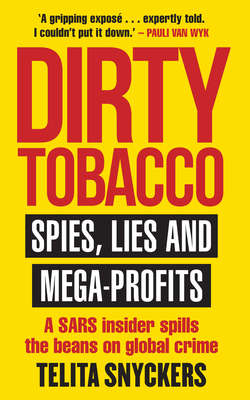Читать книгу Dirty Tobacco - Telita Snyckers - Страница 16
На сайте Литреса книга снята с продажи.
9. A playbook for profit
ОглавлениеWith the rise of competitors, and more stringent regulation about what it can sell to whom, where and how, big tobacco has had to change its tactics. And as big tobacco has faced more pressure, both from regulators and other competitors, so too, in my view, would the nature and sophistication of its evasion and illegal activities probably have had to change.
What may have once been pure smuggling has become increasingly complex aggressive tax avoidance with mounting evidence pointing to the use of convoluted constructs like thin capitalisation, transfer pricing, money laundering and fictitious revenue schemes.1
It’s the very story that sits at the heart of this book: The industry may have once focused simply on getting its own products out the door, but it has increasingly become about undermining smaller competitors to maintain market share and employing corporate espionage and sabotage tactics in order to position their brands and squeeze out the competition. In many countries – probably most – big tobacco continues to dominate the landscape.
Big tobacco may, indeed, be increasingly toeing the line in markets where it is being closely watched by governments and the many anti-tobacco organisations, and where it has paid massive fines, simply because it has to. As regulatory efforts step up – at least in more advanced, better-regulated economies – its room to manoeuvre is increasingly limited.
The tobacco industry has had five centuries to refine its strategy and business model and rhetoric, and it has done so with remarkable agility.
